#orthofacts
Explore tagged Tumblr posts
Text
Ortho Info Compilation Master List

・Ortho and his Parents ・Birthdays and Grim ・Being a Student (pt1) ・Being a Student (pt2) ・Being a Student (pt3) ・Ortho's Abilities (pt1) ・Ortho's Abilities (pt2) ・Ortho's Abilities (pt3) ・Ortho's Abilities (pt4) ・Ortho's Abilities (pt5) ・Ortho and Halloween ・Appearance, Honorifics and Games ・Ortho, Azul and Leona ・Ortho and Kalim ・Eating and Being Helpful ・Mischief and Sneakiness ・Ortho, Competitive ・NRC and hacking ・Wish Upon a Star ・Ortho and Idia (pt1) ・Ortho and Idia (pt2) ・Ortho and Idia (pt3) ・Ortho and Idia (pt4) ・Ortho and Idia (pt5) ・Ortho and Idia (pt6) ・Ortho and Idia (pt7) ・Ortho and Idia (pt8) ・Ortho, Malleus and Lightning ・Ortho's Gear (pt1) ・Ortho's Gear (pt2) ・Ortho's Gear (pt3) ・Ortho and Deuce ・Book 6 (pt1) ・Book 6 (pt2) ・Book 6 (pt3) ・Ortho in Book 7 ・Riddle and Film Club
76 notes
·
View notes
Text
@DrJohnOrchard : @Orthofacts I’m sure evidence-based medicine would seem a horse as tall as a giraffe to most Orthopods, so hell yeah, very fricking high! 😏
@DrJohnOrchard : @Orthofacts I’m sure evidence-based medicine would seem a horse as tall as a giraffe to most Orthopods, so hell yeah, very fricking high! 😏
I’m sure evidence-based medicine would seem a horse as tall as a giraffe to most Orthopods, so hell yeah, very fricking high! 😏
— John Orchard (@DrJohnOrchard) September 1, 2019
https://platform.twitter.com/widgets.js
September 01, 2019 at 05:06PM via Twitter https://twitter.com/DrJohnOrchard
View On WordPress
0 notes
Text
Charlot ministre de la vérité, par Frédéric Lordon (Les blogs du Diplo, 22 février 2017)
Charlot ministre de la vérité, par Frédéric Lordon (Les blogs du Diplo, 22 février 2017) ►http://blog.mondediplo.net/2017-02-22-Charlot-ministre-de-la-verite http://ift.tt/2lxZYzP
Frédéric Lordon est en grande forme. Faut dire que quand c’est trop,...
Admettons-le : au début on n’a pas voulu y croire. Lorsque le 3 janvier on a entendu Samuel Laurent, « décodeur » en chef au Monde, annoncer « une innovation technologique (1) » conçue pour défaire la post-vérité, on s’est dit que c’était trop beau pour être vrai. Mais l’époque dispense sans compter, et il faut désormais tenir pour acquis qu’elle est capable de tout. La suite a prouvé combien. Il y a d’abord ce nom grotesque, Decodex, qui fait surtout penser aux collants bleus de Fantômas ou bien au manteau noir de Judex — et donne irrésistiblement envie d’avoir accès aux minutes du brainstorming, qu’on imagine quelque part entre Veritator, Orthofact et Rectifias. Il y a surtout une trouvaille dont on ne sait plus s’il faut l’assimiler au geste d’une performance artistique ou au comique du cinéma muet. Construire la machine à gifles et s’y attacher la tête dans l’ouverture, Buster Keaton ou Charlot n’auraient sans doute pas fait mieux. C’est que les génies du décodage se sont fabriqué pour longtemps des journées difficiles. Comme de juste, pas une des (nombreuses) traces de pneu de la presse « crédible » labellisée « vert » ne leur sera épargnée, immanquable avalanche dont les effets sur la santé nerveuse du chef décodeur sont déjà constatables sur les réseaux sociaux. Et chaque fois que le ministère de la vérité proteste de ses justifications doctrinales, c’est derechef pour faire tourner à plein régime la turbine à claques.
Leibniz nomme « géométral » de toutes les perspectives le point de vue sur tous les points de vue, le point de vue suprême qui cesse d’être un point de vue particulier parce qu’il les synthétise tous. Le géométral, c’est le point de vue de Dieu. Ou, donc, du Monde. C’est bien connu : Le Monde n’a pas de point de vue. Il n’est pas l’organe officiel de la mondialisation, de l’Europe libérale, de la réforme indéfinie, et de l’entreprise-qui-crée-l’emploi — ou s’il l’est, il n’est que le porte-parole de la nature des choses. Et quand, de temps à autre, admettons-le, des « opinions » s’y font entendre, c’est dans les pages spéciales des éditoriaux, des chroniques et des tribunes, hermétiquement séparées du reste du journal voué, lui, aux faits vrais et à l’information neutre. Aussi bien Daniel Schneidermann que François Ruffin (7) s’essayent à faire comprendre à Samuel Laurent que c’est le propre du point de vue dominant que de pouvoir se nier comme point de vue particulier,
Il y a comme une loi de proportionnalité du monde social qui justifie la critique en rapport avec l’importance des positions de pouvoir et des prétentions qui s’y expriment. C’est que la détention d’un pouvoir exorbitant conduit nécessairement à questionner la légitimité des détenteurs, et qu’en l’espèce on est conduit à se demander comment des pouvoirs aussi considérables se sont trouvés remis à des individus aussi insuffisants. La pédagogie généralisée de l’information vraie ne pouvait donc manquer de faire revenir la bonne vieille question de Marx de savoir qui éduque les éducateurs. On se dit d’abord que la croyance forcenée en un journalisme vierge de point de vue et riche seulement de faits devrait suffire à interdire l’accès à la profession. On se demande ensuite ce qui se passe dans les écoles de journalisme pour qu’on en laisse sortir des « diplômés » dans cet état. Sont-elles toutes sinistrées à ce point (ou n’y en a-t-il pas une ou deux qui résistent) ? À quel effondrement président-elles ? La dégradation intellectuelle du journalisme est-elle si avancée que le laisse entrevoir l’aval enthousiaste donné à la philosophie du Decodex jusqu’au plus haut niveau du « quotidien de référence » ?
« Quand un patron parle, c’est de l’économie, quand un syndicaliste parle, c’est du militantisme »
Il y aurait beaucoup à dire sur le geste qui conduit, sans visiblement qu’il en ait conscience, Le Monde à épouser cette pratique néolibérale entre toutes de l’évaluation généralisée — des autres. Comme on sait, née dans la finance, la pratique de l’évaluation est en voie de coloniser toutes les sphères de la vie sociale, organisant par là leur soumission à la logique d’une société de marché de part en part régie par le principe de concurrence. On évalue les chauffeurs de VTC, les appartements de location, les toilettes d’aéroport, et sans doute bientôt les dîners entre amis — le « code couleur », cette tragédie de la couleur que même la plus fertile imagination dystopique n’aurait pas pu anticiper. Voilà donc que Le Monde distribue des couleurs à l’information comme d’autres aux apports nutritionnels ou aux pots d’échappement. Le Monde est bien le journal de ce monde.
Que le journalisme commence avec l’établissement de faits et la dénonciation des contre-vérités flagrantes, c’est une telle évidence qu’on se demande comment des titres ont cru y voir le motif d’une rubrique spéciale, en excès de leur habitude ordinaire qui prescrit pourtant depuis des lustres cette exigence presque constitutive de procéder à des vérifications élémentaires. Ceci d’ailleurs pour des raisons qui sont vieilles comme la politique : sitôt qu’ils ne sont plus surveillés comme le lait sur le feu les pouvoirs mentent, les institutions mentent, l’État ment. Le mensonge leur est constitutionnel, comme à toutes les institutions autonomisées, toujours tendanciellement portées à oublier ce qu’était leur fonction première, pour ne plus vivre que pour elles-mêmes.
#decodex #fake_news #post_truth
from Arnaud Ferrat (@arnoferrat) - Seenthis http://ift.tt/2lqlRT2 via IFTTT
0 notes
Text
Ortho Updated Facts Part 10: Ortho and Deuce
Deuce takes Ortho to a blastcycle workshop by his home so that Ortho can use their 3D printer to create his Rabbit Gear, but they are met with hostility: the owner refuses to let Deuce inside the shop, saying that he does not care how many times Dylla apologized for his past actions and sending him away.


Ortho interrupts and introduces himself as a humanoid, which seems to intrigue the owner of the workshop.
He still refuses to allow them the use of his shop on the basis of Deuce being too much of a liability and Ortho asks, “Do you really think Deuce is just acting polite in order to make you drop your guard? I promise, Deuce is not smart enough to think of a plan like that, let alone pull it off!”


The workshop owner reluctantly grants them the use of his workshop, saying that he does not want to disappoint a humanoid kid.
Deuce explains his situation and asks Ortho to keep the secret, making Ortho one of very few people who have been told the details of Deuce’s pre-NRC lifestyle: perhaps only Epel, Grim, the prefect and Ortho himself?
Ortho agrees to keep the secret as long as Deuce helps him craft the Rabbit Gear, and Deuce agrees.



Deuce says that he is impressed by how Ortho was able to talk down the angry workshop owner and Ortho explains, “Considering he works on blastcycles, I imagined he must be interested in all manner of machines, including robots. So I played up the humanoid angle, suspecting he was bound to be curious.”
During the race a bully mocks Ortho to Deuce, saying that he looks like a little kid. Deuce responds, “Underestimate him at your peril.”
Ortho has a voice line of, “Deuce Spade claimed he is an honor student back at school. But this contradicts my memory banks.”
71 notes
·
View notes
Text
Ortho Updated Facts Part 1: Being a Student (pt1)
Pre-Book 6 Ortho did not have classes of his own to attend and only attended classes on non-test days, with Idia.



He expresses surprise when he is selected to be Lilia's interviewer for his second birthday vignette, as he "thought the Magical Birthday Dice chose an interviewer from the student body," and he did not count at the time.
(His third birthday interview begins with, “Getting interviewed on my birthday while also being a Night Raven College student is a dream come true!”)


Ortho explains, “When I can’t be with (Idia), I take walks on campus and chat with people. I recently visited Professor Trein, and he let me read his books. He also played games with me. That was lots of fun. I’ve never met my grandpa, but if he were here, maybe he’d be like that. The other fun part about visiting Professor Trein is getting to talk with Lucius.”



Before enrolling in class 1-C Ortho says that all he would do in Idia’s classes was “sit next to him and optimize my internal memory…sometimes I take classes with everybody else when the mood strikes. The teachers don’t say anything about it.”
Ortho was also not qualified to participate in Beanfest, so his role in the event is mostly helping Idia relocate a weapon he has designed to the school store under the cover of darkness.
While suspicious of the legality of Idia’s approach he is happy for Idia to be voluntarily taking part in a school activity at all.



In Book 5 we learn that Idia got permission from the headmage to allow Ortho to attend his classes with him, and in Book 6 Jamil guesses that someone from as prestigious a family as the Shrouds wouldn’t attend school without any aids (much like how he himself serves Kalim), and that that is why Ortho received that special permission.
Now a “proper student” at the school Ortho is trying a variety of things to gain experience, such as working at the school store.
His new year resolution is to do club activities and school and events in order to “see what else being a student at Night Raven College has to offer.”
72 notes
·
View notes
Text
Ortho Updated Facts Part 11: Ortho and his Parents
When Ortho’s alert of Malleus' overblot reaches STYX the Director responds “What if the worst has happened to everyone on the island, including our boys..?"
The Chief Engineer refers to herself as one Ortho’s parents and Ortho refers to the two of them as mom and dad.
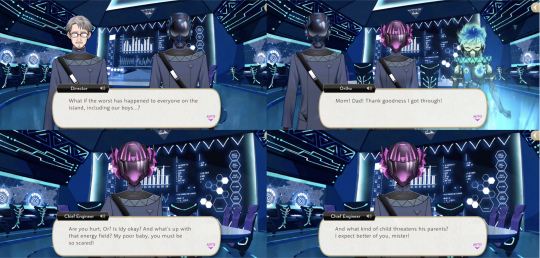
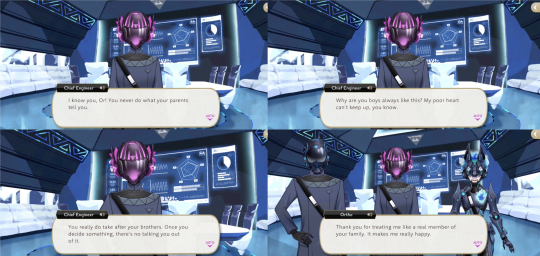
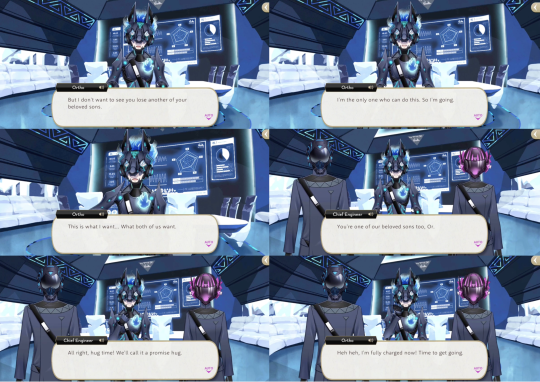
When speaking to Ortho the Chief Engineer says, “You really do take after your brothers,” so Idia’s parents may have adopted robot-Ortho into their family as a third son rather than as a replacement for their second.
Ortho thanks them for treating him like a member of the family and insists that he wants to take on the dangerous mission of infiltrating Malleus’ domain as he doesn’t want them to lose another of their beloved sons (in reference to Idia), saying, “This is what I want…what both of us want,” possibly in reference to both himself and human-Ortho.
The Chief Engineer responds, “You’re one of our beloved sons, too,” and the family shares a promise hug.
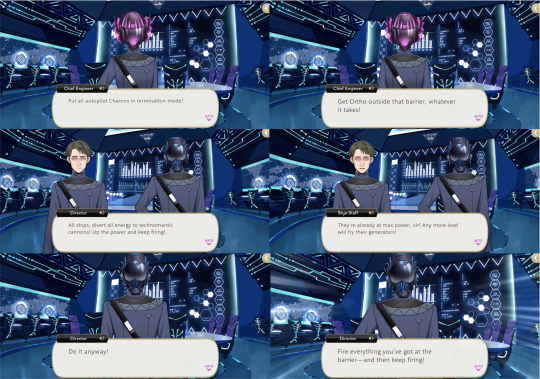
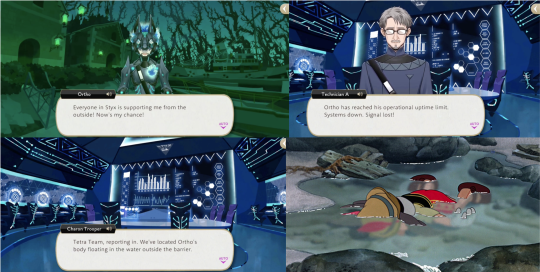
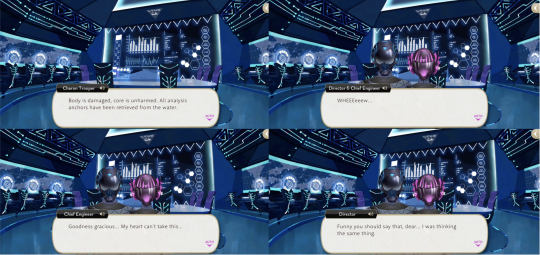
When Malleus starts trying to destroy Ortho his parents respond by putting all the CHARON into termination mode and diverting all energy to their technomantic cannons in order to distract Malleus. When a staff member cautions that they will fry their generators the Director responds, “Do it anyway!”
Ortho manages to escape Malleus’ domain with the data he was sent in to collect and is found with his Cerberus gear floating in the water outside of Malleus’ barrier, possibly in a reference to the original animated Pinnochio movie.
His parents are relieved.
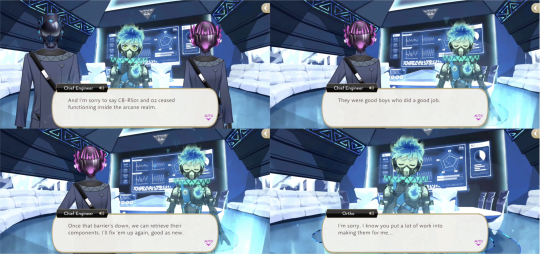
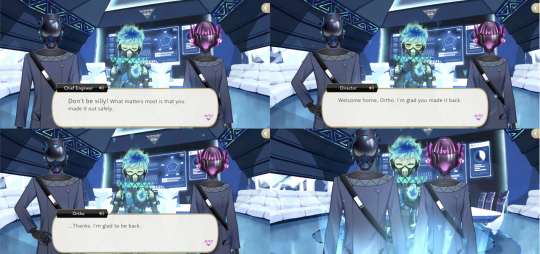
Ortho apologizes for losing the two android dogs that his mother made for him and she responds, “What matters most is that you made it out safely,” saying that she can fix them up again after their components are retrieved. The Director welcomes Ortho home and the family shares another hug.
It is Idia and Ortho’s parents who come up with the idea of making dream-based contact with those within Malleus’ domain to approach Malleus from inside his own worlds: “If we can't do anything from the outside, we have to work from the inside instead.”
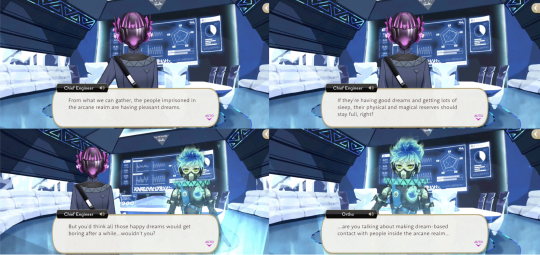
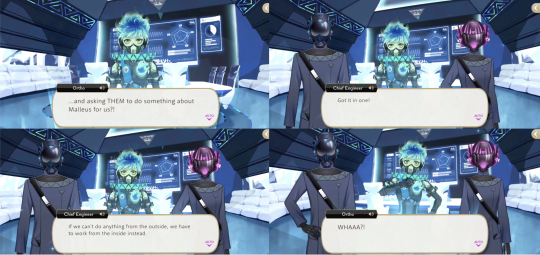
67 notes
·
View notes
Text
Updated Ortho Facts Part 22: Ortho and Idia (pt2)
After Malleus’ overblot Ortho checks on Idia first out of everyone, and when Silver and Sebek are crushing Idia between them it is Ortho who asks them to give him space.



We learn in Book 7 that despite how Ortho has had his own room (with roommates) since the end of Book 6, his maintenance station is still set up in Idia’s room.



Ortho’s father cautions him about making contact with Idia within Idia’s dream world, as there is a chance that Idia would reject him: “Your maintenance station was gone from his room. Surely you can put together what that signifies. This could be deeply unpleasant for you.”
The Director shares his plan of reaching out to “a professional with a PhD in psychology” to try and avoid as much confusion as possible, but Ortho says he will be fine as Idia will most likely greet him with, “A handsome young humanoid is asking me for help from inside my computer?! I've read literally 500 million light novels with this exact premise! Is it finally time for me to be the chosen one?!"
Ortho is proven correct.



Ortho appears in Idia’s dream in-person in order to save him, triggering a paradox as his very existence compromises Idia’s world. Ortho swears to do whatever it takes to save him.
During his Master Chef class Ortho decides to use his Cooking Gear to help improve Idia’s diet.
Ortho buys apple-core-flavored candy and a postcard for Idia at Playfulland, and in Clock Town he buys potato chips that can only be bought locally for Idia to eat while gaming.



Ortho will often mention Idia in conversation: when discussing detail-oriented people Epel suggests that performing delicate work might make someone have a delicate personality as well and Ortho comments, “My brother is a wiz with technology...but he's not like that at all.”


He also quotes Idia during the Rabbit Run race, saying, “As my brother would say, the dungeon's not really beat until you've sprung all the traps,” and says that he cannot wait to tell Idia about the experience.
Ortho says that it is difficult for him to make things from scratch, so he really respects people who are able to do so, and especially Idia.


57 notes
·
View notes
Text
Ortho Updated Facts Part 13: Ortho's Gear (pt2)



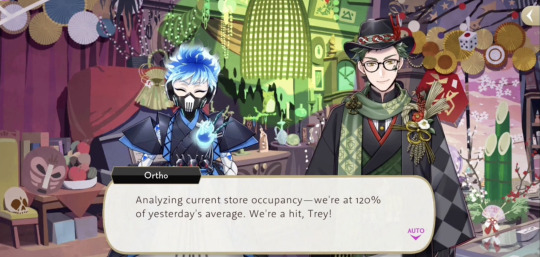

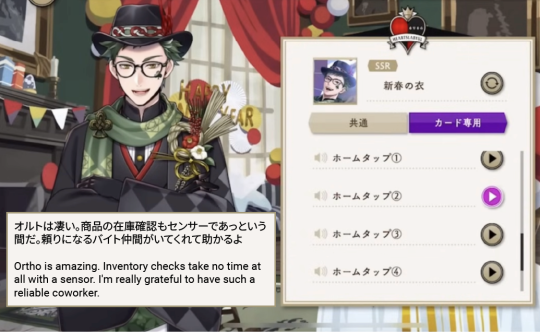
New Year’s Gear (attachments developed by Sam) ・store occupancy analysis ・simulation projection ・vital signs scanning ・inventory confirmation sensor
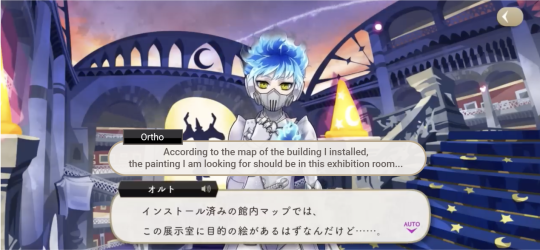
Platinum Gear ・Museum map access
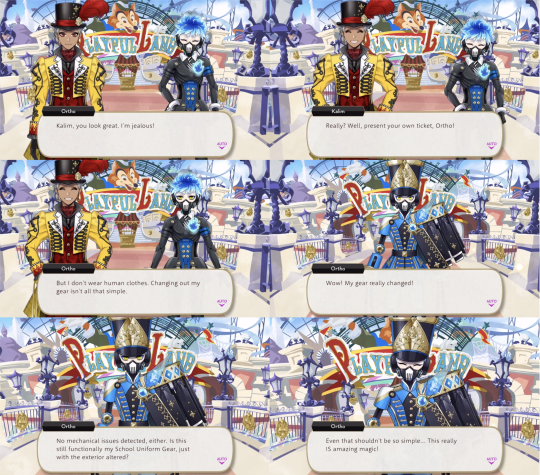

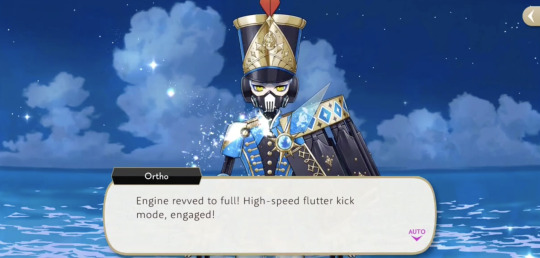
Playful Gear (designed by playfulland) ・same functionality as school uniform gear ・body scanning ・magic scanning ・high-speed flutter kick mode
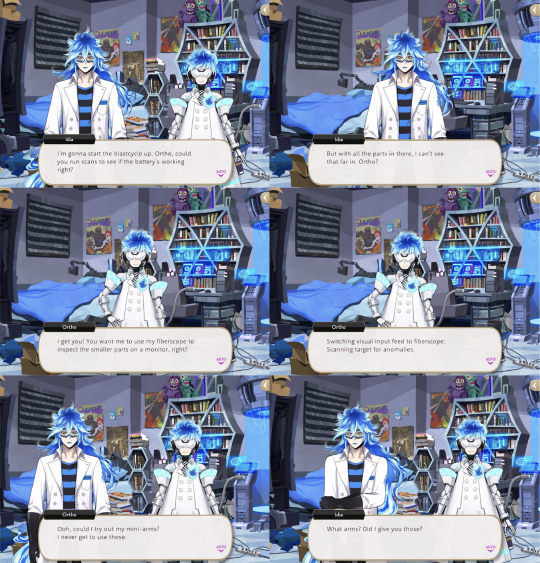
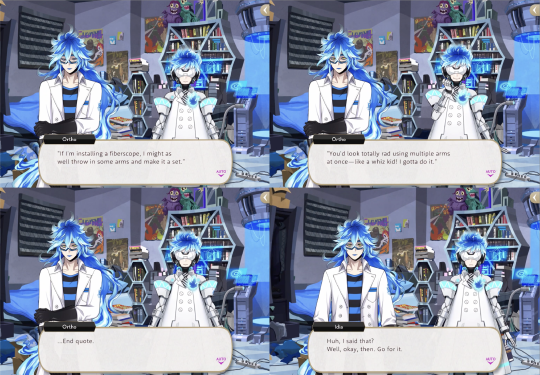
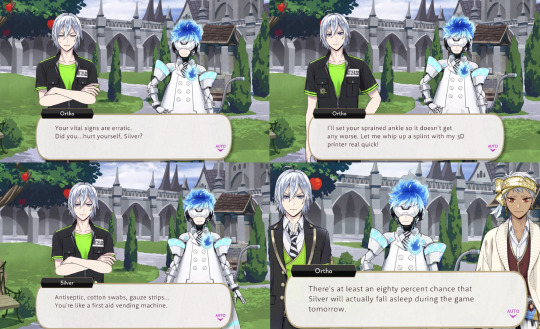
Precision Gear (developed by Idia) ・a fiberscope ・mini-arms ・a 3D printer ・a first-aid kit ・Ability to estimate the likelihood of Silver falling asleep
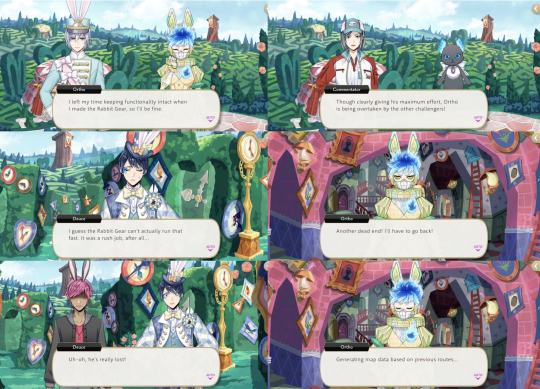
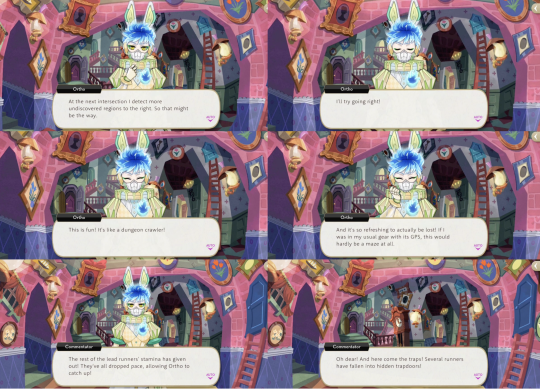
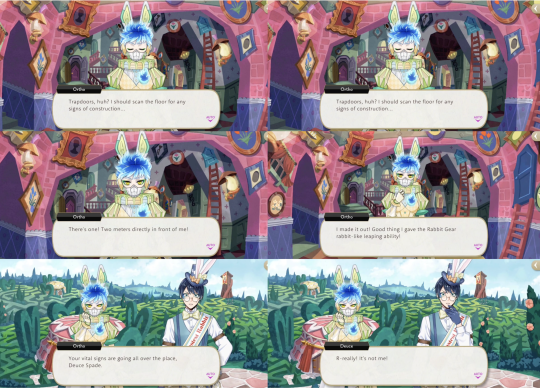
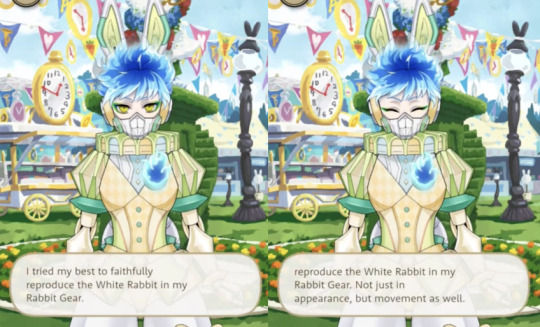

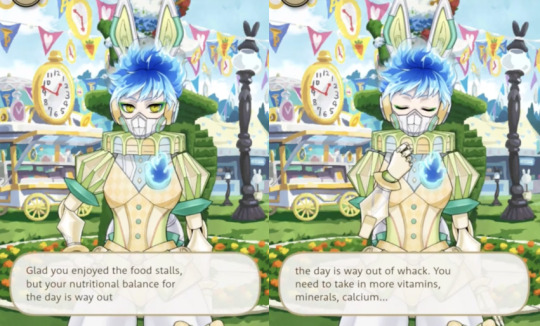
Rabbit Gear v.1 (developed by Ortho) ・anti-gravity omitted in favor of basic walking protoocls and running capabilities ・vital signs scanning ・photography ・laser function removed ・time keeping functionality ・map generation (GPS removed) ・floor scanning ・rabbit-like leaping ability ・nutritional balance scanning?
Rabbit Gear v.2 (developed by Ortho) ・anti-gravity ・high-speed movement ・flight ・laser ・rabbit mimic mode (running, hopping) ・heat signal detection

Stargazer Gear (developed by Idia) ・weather calculation ・the ability to fly into space
Ortho seems to have a “sleep mode,” a “low illumination mode” and an “auto mode.”
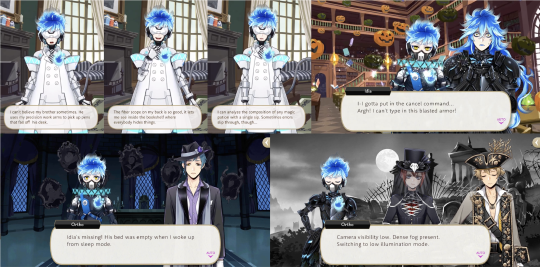
It seems that Ortho may not usually be waterproof: he says that "It must be nice being able to just take a quick bath or do laundry whenever. Washing my parts takes ages…” and “I’m good at diving! Oh, I mean deep-diving online, not literal swimming," but his Cooking and Playfulland Gear are specified as being waterproof.
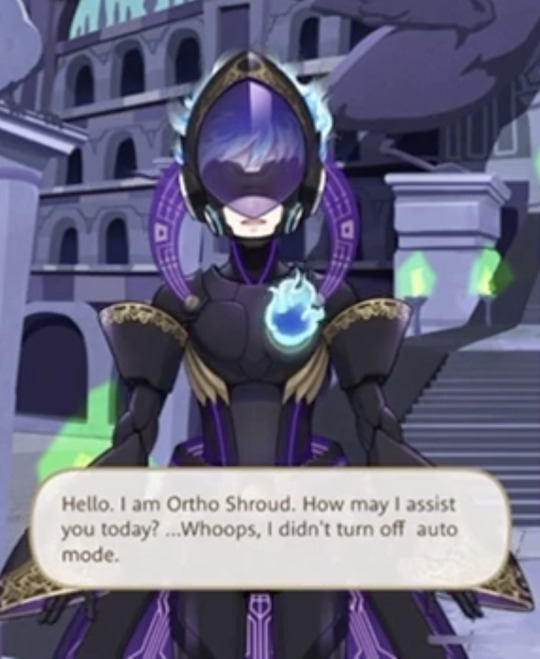
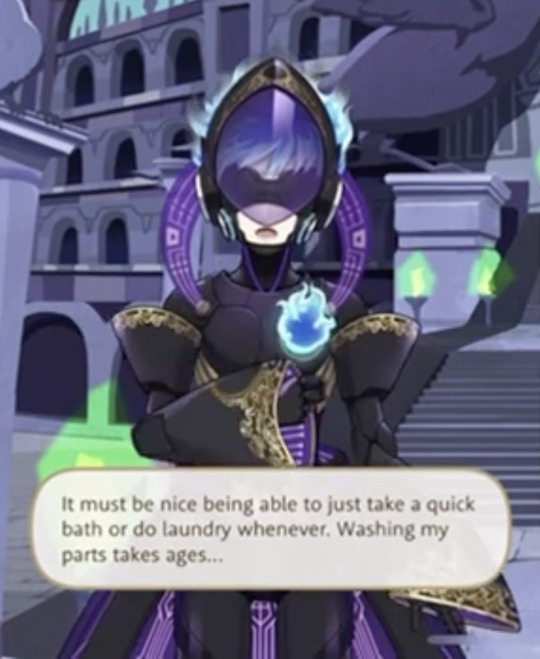
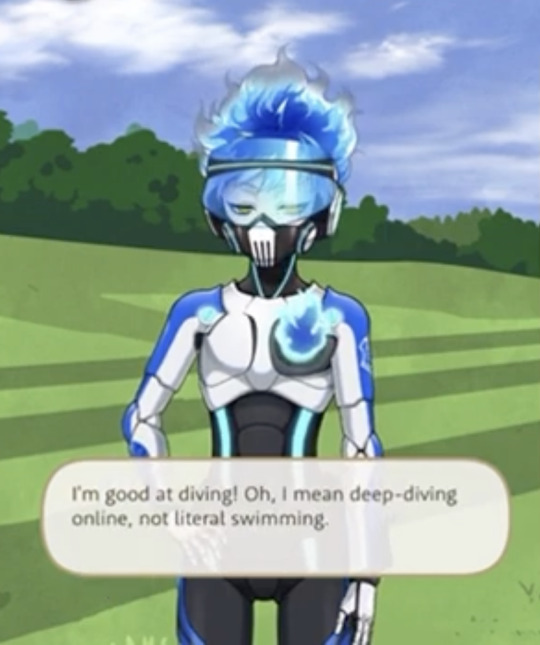


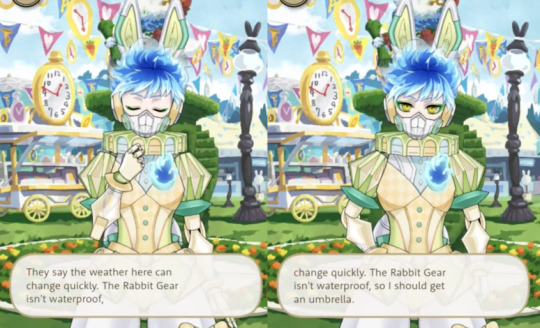
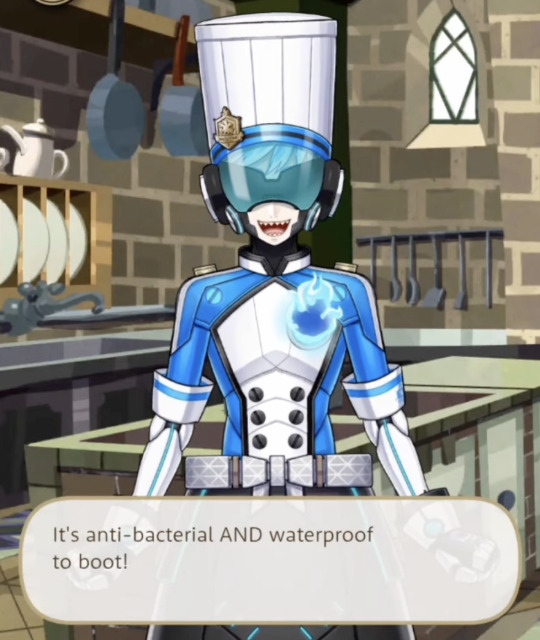
55 notes
·
View notes
Text
Ortho Updated Facts Part 9: Mischief and Sneakiness
Much like Lilia, Ortho seems to enjoy pranks. He mentions trying to “play a trick on Leona Kingscholar by tying up his tail" and says that “When everybody’s attending ceremonies, the classrooms are all empty, making it prime time for pranking.”



Ortho seems more suspicious of those around him than Kalim and Silver: prior to Beanfest Rook says that he is advising members of the opposite team because he wants to “have a most delightful Beanfest, with all of you!” and Silver and Kalim respond with, “sensible enough”, “What a good guy you are, Rook!”, while Ortho says, “I’m more worried about how easily you both swallowed that explanation…”
During his birthday vignette Ortho explains that the students of Ignihyde try to hide information from him by using analog methods like handwriting, but “little do they know, I can expand my auditory range to eavesdrop on their planning meetings, so I still know everything they discuss.”



Ortho has been programmed to be able to lie. After a pair of bullies insult Idia he lies to Trein, setting up a screen on the Main Street of the school to project embarrassing videos of the bullies in revenge and then pretending otherwise.
During Special Soiree he sets up a surprise for Riddle to try and get him interested in treasure hunting by pretending to find a clue (that accidentally ends up being a real clue), immediately confessing the misdirect to Ruggie.



Ruggie tells him, “never, ever tell Riddle what you just told me.” Riddle is delighted by finding what they were looking for (unaware that the hunt was instigated by Ortho’s misdirect), expressing excitement at “the heart-pounding rush of anticipation right before (Ortho) opened the box…I’ve never felt this way before!”
Ortho reflects, “Maybe it was too stimulating for Riddle Rosehearts.”



When Ortho volunteers to infiltrate Malleus’ domain the Chief Engineer initially refuses to allow it for being too dangerous. Ortho pretends that the satellite he is using to connect STYX is passing into the planet’s shadow to escape the conversation and says, “if you don't have anything ready by the time I get back home...Cerberus and I will permanently activate every sprinkler on the Island of Woe.”
When Ortho successfully reaches STYX he is chastised with, “what kind of child threatens his parents? I expect better of you, mister!”


58 notes
·
View notes
Text
Ortho Updated Facts Part 6: Ortho and Vil



During Book 6 Vil comments, "Ortho’s been putting on quite the villainous performance. It seems to me he could drop all this nonsense about resetting the world and start an acting career.” Rook asks Vil about Ortho joining the Film Club and Vil responds, “I think you might be onto something there.”
We see Ortho trying to decide on a club during a vignette (the other first-year students are in sports clubs, and Ortho says he is more interested in new experiences than improving his performance), reflecting on how he would watch films “to acquire proper emotive capabilities.”



Before Vil has the chance to extend an invitation for him to join the Film Research Club Ortho asks to be allowed in himself. Vil grants him membership without an audition as he has “already seen more than enough of your acting back on the Island of Woe.”
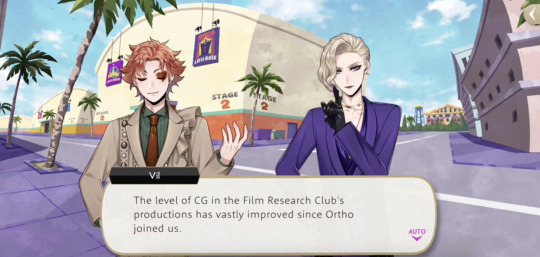
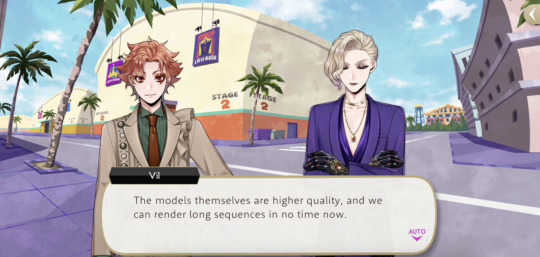
Vil says, "The level of CG in the Film Research Club's productions has vastly improved since Ortho joined us. The models themselves are higher quality, and we can render long sequences in no time now."


Ortho explains that he first started watching movies in order “to study human emotions. I had trouble conducting myself in human-like ways when my brother first built me. I didn’t really understand when it was appropriate to get mad, or to laugh. Movies helped me solve that problem, though.”
He says that, “Nowadays, watching movies is more or less something I just do for fun.”
Riddle and Leona call in Vil and Crewel to assist with Fairy Gala IF and Vil and Crewel invite Ortho, with Vil saying, “Ortho is essential for your success at the fashion show. No one is more fitting for the theme of evolution than Ortho Shroud.”


Book 5 is Ortho's first appearance in the main story, where he fails the audition for the VDC when Vil reacts to his performance with, “I’ve heard of genreless, but this is ridiculous.” Despite this, Vil seems fond of Ortho. Vil refuses to teach him make up techniques for Halloween as his costume uses a mask, but when Ortho is disappointed in the loss of a learning opportunity Vil follows with, “I jest…I will pick out some skincare products for you.”
When Idia rejects Ortho’s invitation to Playfulland Ortho confides in Vil and, rather than comment on his ditching of school, Vil encourages him to showcase his acting skills and convince Idia to go with him via “a wholeheartedly tearful performance.”
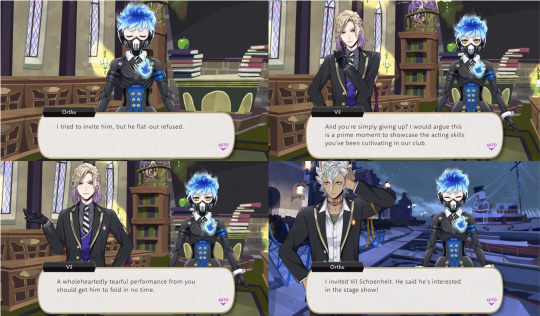
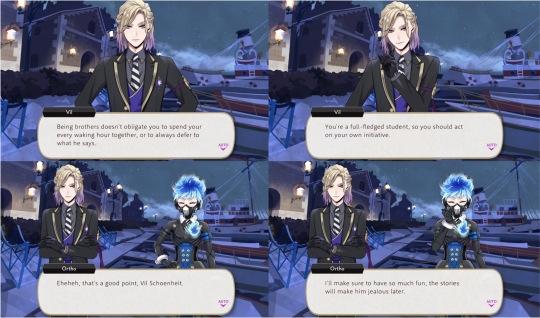
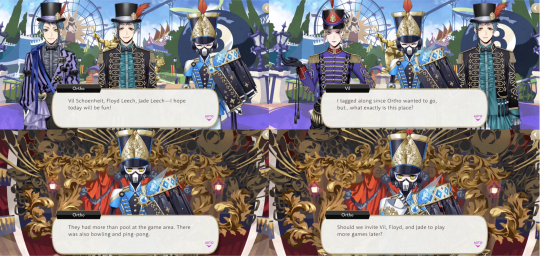
Ortho invites Vil, instead, who tells Ortho that he is not obligated to spend his every waking hour with Idia or to defer to him, even though they’re brothers. Vil and Ortho end up in a group together (with Floyd and Jade).
When Ortho refuses to run away from Playfulland without challenging Fellow to a fight, Vil agrees with him.
Vil is less enthused after the majority of the group has been captured, calling Ortho “A spudling with broken brakes who seems reasonable, but resorts to extreme measures at the drop of a hat.”
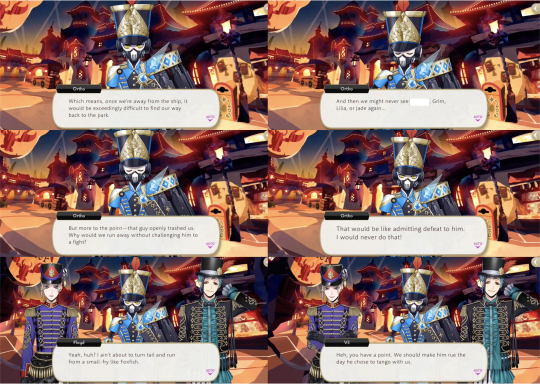
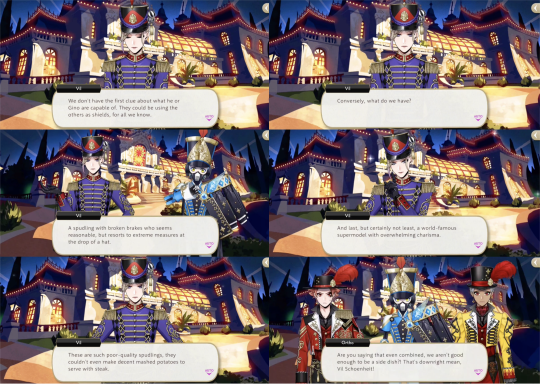
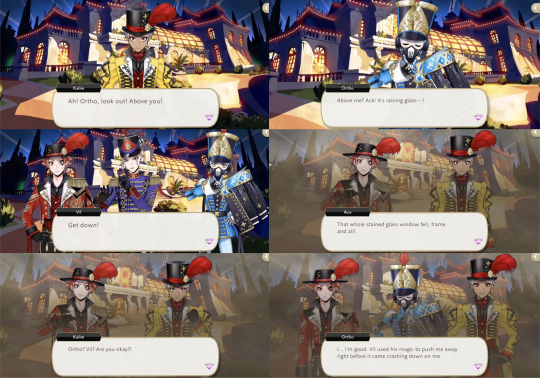
Vil saves Ortho from a collapsing stained glass window but gets trapped himself, sending them on alone. Ortho exclaims, “Without you, it's just going to be me and two pieces of dead weight. I can't possibly fight in those conditions!”
Vil encourages the group to figure out the situation for themselves and buys them time to escape the puppets.
After they, too, are captured Ortho reflects, “I just became a student, yet here I am, getting turned into a puppet and dragging Vil down with me…”
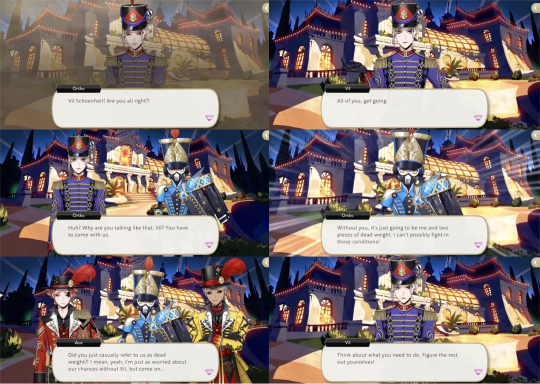
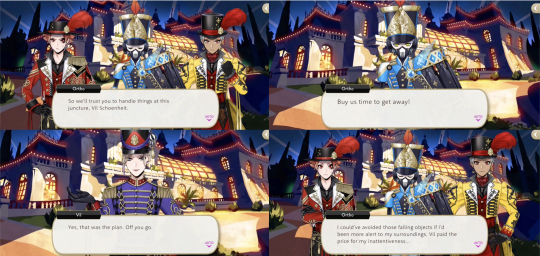
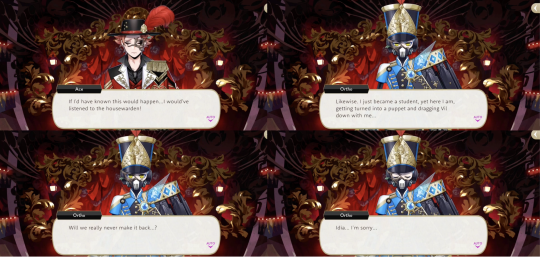
Ortho gives us a rare example of a student buying a souvenir for someone who is not in their same dorm during the White Rabbit Fes event, when he buys perfume for Vil, saying, “Vil has always been good to me in the Film Research Club, so I'd like to get him something as well.”
When the vendor asks how he feels about the recipient (in order to find a suitable scent) Ortho responds, “He’s very…STRONG!!!”
The vendor recommends a “very warm scent, with harmonious notes of fresh citrus and an amber accord,” which Ortho confirms are compliant ingredients and purchases for Vil.

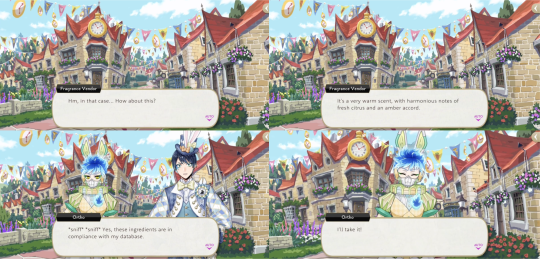
Ortho says that he pays special attention to movement as a member of the Film Research Club, and he spends a lot of his time off watching movies and livestreams of plays.

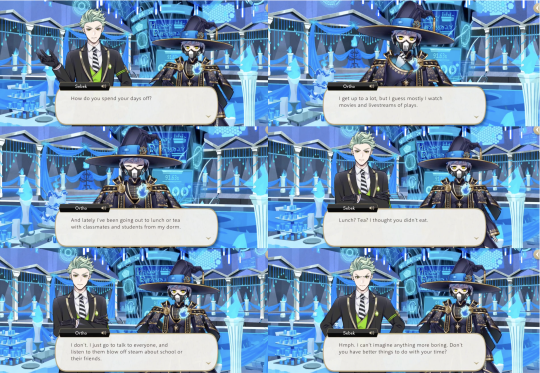
He says that lately he has been going to to lunch or tea with classmates and other students despite how he cannot eat because of how much he learns from “observing the way people get worked up about all the little things.”
Ortho explains that he draws on the stories his classmates tell him when he really wants to disappear into a role. (Sebek: “So you use your interactions with humans as fodder for your acting.”)
Vil has a voice line about Ortho wanting to incorporate the sense of humor of the King of the Underworld into his performances.
When asked what dorm (besides Ignihyde) he would like to join, Ortho responds: Pomefiore.
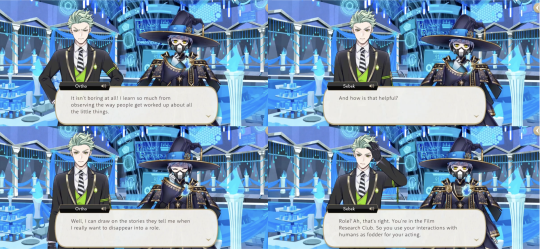
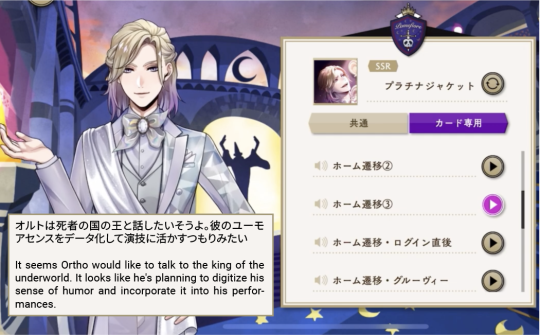
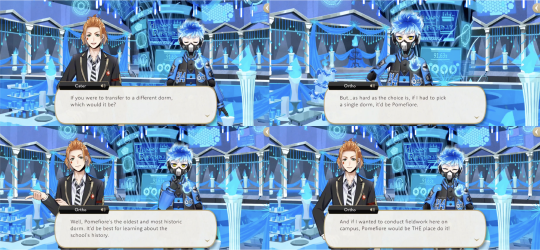
55 notes
·
View notes
Text
Ortho Updated Facts Part 2: Being a Student (pt2)
Idia refuses to go to Playfulland with Ortho but Vil says, “Being brothers doesn't obligate you to spend your every waking hour together, or to always defer to what he says. You're a full-fledged student, so you should act on your own initiative.”



Ortho says that half the fun of school is having “atypical individuals” like Kalim around, and he is “so glad” that he got to join the Night Raven College student body.
He accepts Deuce’s invitation to the White Rabbit Fes event because “Going to a festival with school friends sounds just like what a normal student would do,” and says that getting lost in a maze (due to having no access to his usual gear with GPS) is “refreshing.”



When asked about flight magic Ortho explains that he cannot use flight magic like a mage, and his “incessant levitating” is made possible by technomantic energy.
Ortho says that, right after becoming a student, he would only audit flight and PE classes because he cannot build endurance or strength through training like the other students. Recently, however, Vargas has brought him on as an assistant.
Ortho explains that he flies alongside his classmates to collect data on their form and times, determines their habits and weaknesses and suggests ways they might improve.
Ortho says that while he may have gotten a heart in Book 6 and thus an imagination he still cannot use magic, but he grateful for the existence of magic as it means he was able to become a student at NRC and make friends.


Ortho compliments Trey’s ability to listen to the customers at the school store, saying that he would also like to become good at reading people.
In his fourth birthday vignette Ortho tells Jade about a memorable event that might have been “moving” by human standards, but he cannot be sure: he witnessed a family that had been fishing without catching anything finally catch a single fish just as they were about to give up, but they ultimately decided to release it because they felt bad for it being so small.
Ortho says he cannot understand the reasoning behind why they released the one fish they managed to catch after putting so much effort into doing so, and wonders if such irrational thoughts are just a part of human nature.


54 notes
·
View notes
Text
Updated Ortho Facts Part 15: Ortho's Abilities (pt1)
Ortho will often reference his “databanks,” which is how he is able to recognize the spectral realm during Halloween. He says they “have a baseline of 100,000 books stored inside" and “include comprehensive data on medicinal herbs and medicines.”
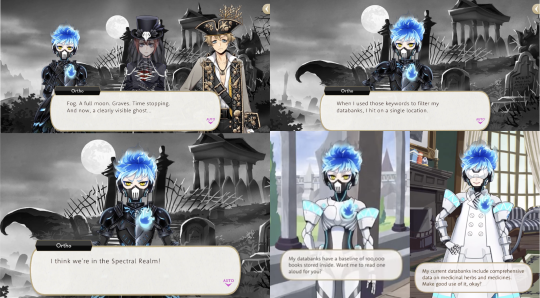
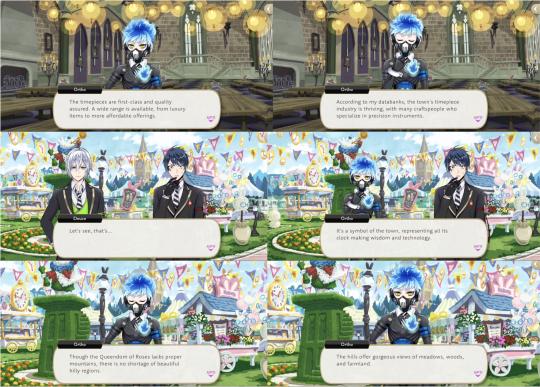
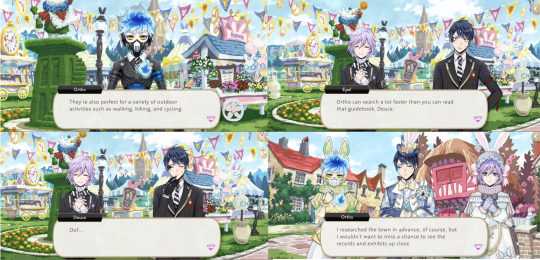
He also has access to information about the Queendom of Roses, with Epel commenting that Ortho can search for information a lot faster than Deuce can read his guidebook on Clock Town.
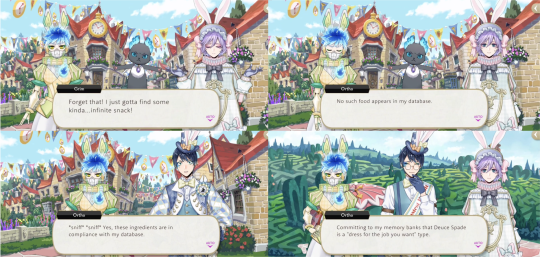
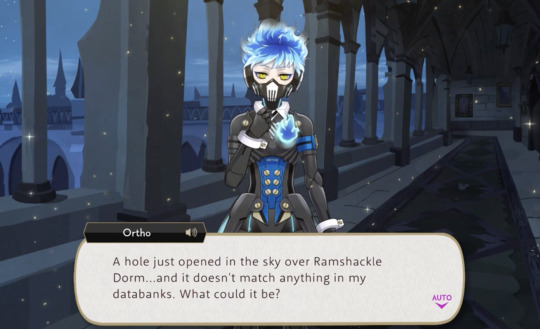
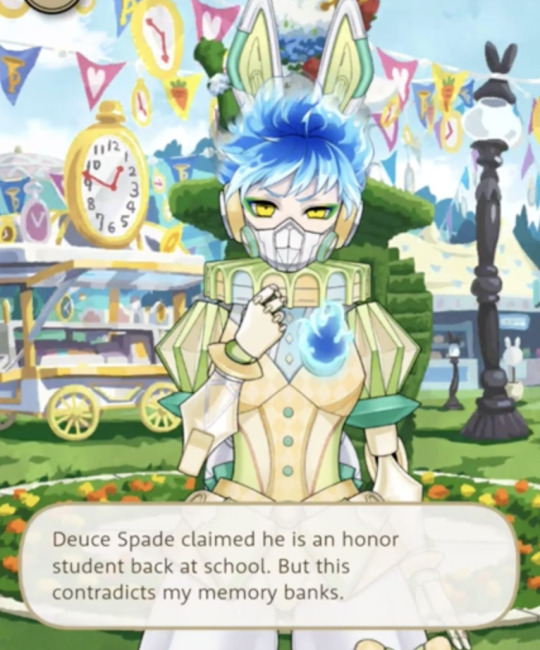
Ortho explains that he first came to the school as Idia’s “gadget,” but now he interacts with humans, and “hearing everyone's thoughts made me realize that the same story can read so differently depending on the person. Because of their values."
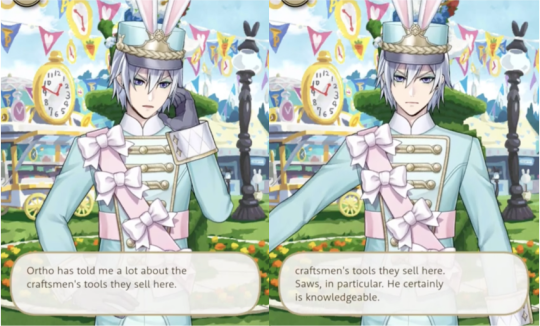
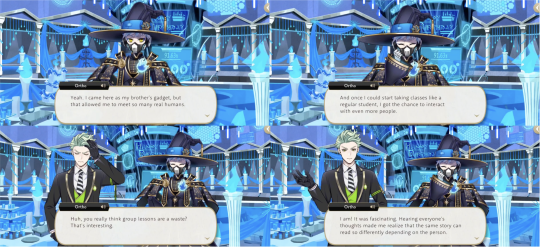
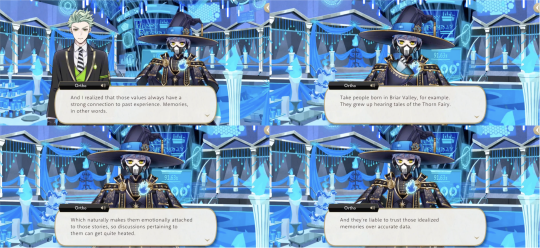
Ortho uses the example of the Thorn Fairy, saying that people who grew up in Briar Valley are so emotionally attached to stories about her that they are liable to trust idealized memories over accurate data.
Sebek is not amused, but Ortho says that he was able to use his database to debunk every contradiction that he’d found, and he and Sebek discuss holding a debate after the birthday interview.
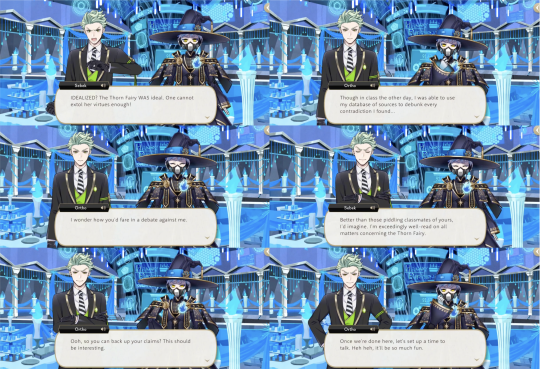
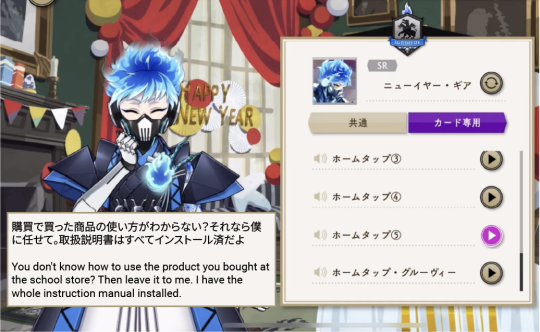

Ortho says he is under order from Idia to never log into satellite position systems, but there does not seem to be anything actually keeping him from doing so.
He can detect people within a 10,000 meter radius (and motion detect within a one-kilometer radius), which he says makes it difficult to sneak up on him. Ortho is also capable of telling whether or not others are being sincere, testing this ability on Ace, Idia, Fellow and Rook.

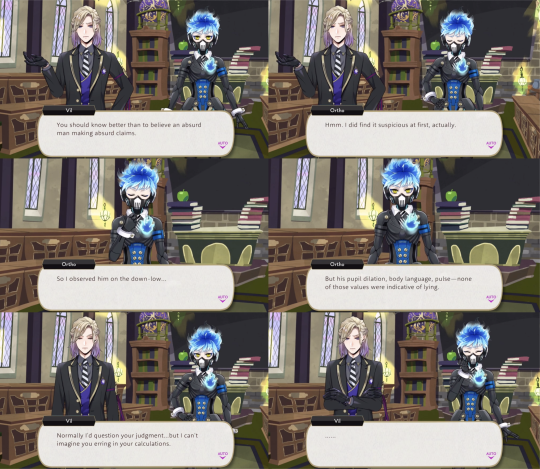
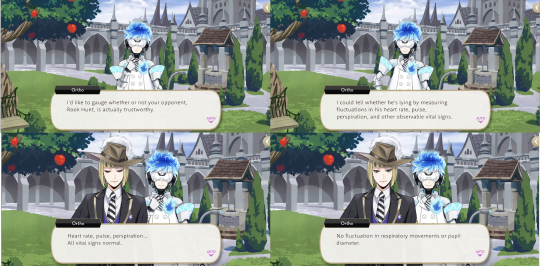
When Vil says he finds Fellow’s claims suspicious Ortho says that he performed a vital signs scan that did not indicate he was lying, but Ortho’s tests for heart rate fluctuations, perspiration and other vital signs might have been duped before, by Rook: Ortho performs what might have been a similar lie detection scan leading up to Beanfest and ultimately declares that Rook was telling the truth, but during Halloween Rook tells Trey that he is capable of controlling his own heart rate.
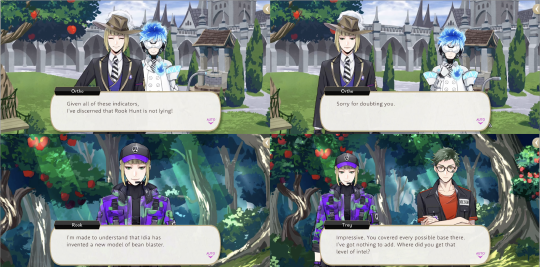
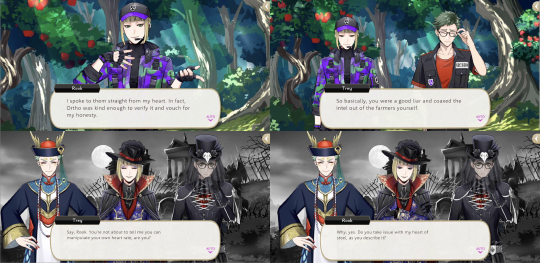
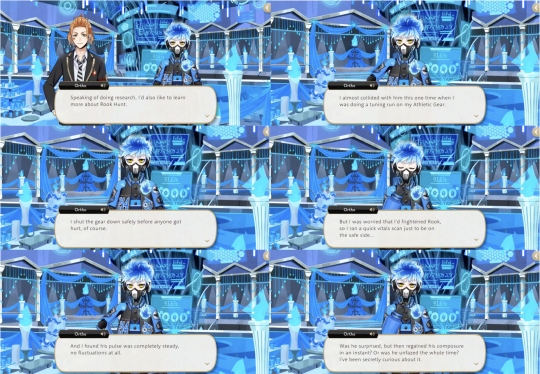
And Rook has baffled Ortho before: Ortho related an incident where he almost collided with Rook during a tuning run on his athletic gear. While no one was hurt, he’d worried that he’d frightened Rook and ran a vitals scan to be safe, only to discover that Rook’s pulse was completely steady with no fluctuations at all.
Ortho: “Was he surprised, but then regained his composure in an instant? Or was he unfazed the whole time? I've been secretly curious about it.”
50 notes
·
View notes
Text
Ortho Updated Facts Part 5: Competitive
Floyd calls Ortho and Trey a “couple of pushovers” during the New Years event (Ortho: “...if you don't take us seriously, I calculate your chance of losing to us as 99.8%”) and Ortho surprises Trey with his competitive streak.



When school store customers start losing interest in playing “a game they know they can’t win” Ortho observes, “so they're the weak-willed sort who throw in the towel when they know they'll lose.”
Trey responds, “We can’t all be as passionate about competition as you, Ortho.”
Ortho’s competitive nature comes up repeatedly during Playfulland, where he says he will be making the confident Floyd eat his words but then fails at their game. (Floyd: “Swing and a miss! That's nine whiffs in a row.”)



Ortho finds that he is much more suited to billiards, offering to take on the entire team alone.
Later Ortho says that the best part of the game was “watching Vil, Floyd and Grim stomping their feet when they lost.”
When Grim says that he let Ortho win, Ortho says they can have a rematch and he will “wipe the floor with (Grim) again,” and that he’d like to team up against Ace and Kalim as well.



After the first students are captured and the remaining members are considering abandoning the island completely, Ortho says that there is a possibility that they will never be able to find their way back and therefore never see Jade, Lilia, Grim or the prefect again.
He then follows with, “But more to the point-that guy openly trashed us. Why would we run away without challenging him to a fight?,” saying that he would never admit defeat to Fellow. Floyd and Vil agree.
On the topic of why he joined the Master Chef class Ortho says that he only recently became interested in cooking after he heard other students talking about how the course was too difficult for beginners, which motivated him to take up the challenge.
During White Rabbit Fes Ortho intentionally plays up being a humanoid upon meeting Dylla for the first time, saying that he wanted to surprise her more than Epel did.



When a bully mocks him for his appearance before the Rabbit Run race Ortho says, “Bad guys always say stuff like that just before they lose, or weren't you aware? Perhaps you should read up on the phenomenon,” and afterwards he upgrades his Rabbit Gear for the sole purpose of defending their title.
Grim says that he will be the anchor in order to get all the glory but Ortho says that it will be him, instead: “And next year we'll avoid all the traps and win by a mile!”



Ortho comes up with the idea of a group investigation to try and solve the mystery of the Ramshackle dorm mirror. When Jack says he goes to sleep by 10pm Grim responds that they can just yell and shake him awake, and Ortho immediately agrees. Epel says, “Ahaha...I never knew you could be pushy, Ortho.”
Ortho also pressures Lilia for his contact information despite Lilia’s attempts to dissuade him, and encourages him to introduce his gaming friend to Idia.
50 notes
·
View notes
Text
Updated Ortho Facts Part 20: Ortho, Malleus and Lightning
Malleus and Ortho do not interact often, and mostly in a Halloween vignette where Ortho uses his database to help Malleus decide on what Diasomnia should wear for their Halloween costumes.
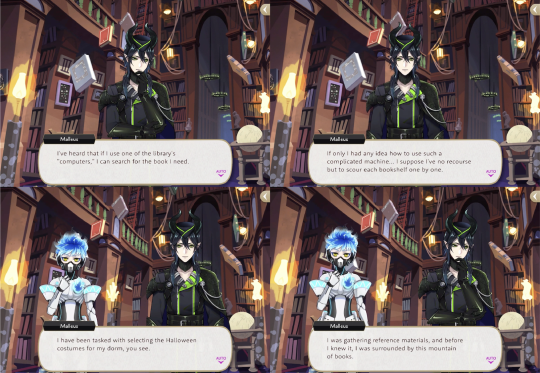
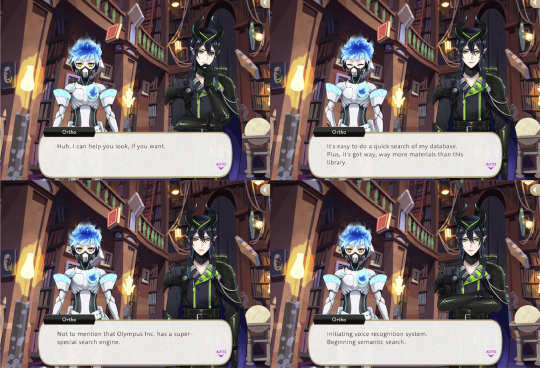
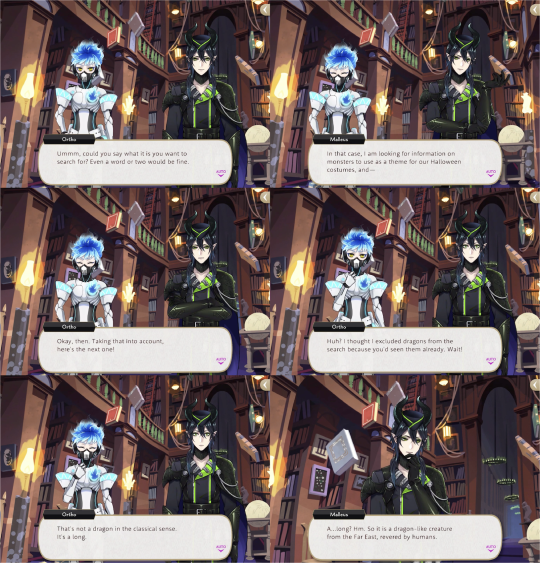
With Ortho’s assistance Malleus decides on longs (“a dragon-like creature from the Far East, revered by humans”), acknowledging that while he is grateful for Ortho’s help, he has “no idea how he did what he did.”
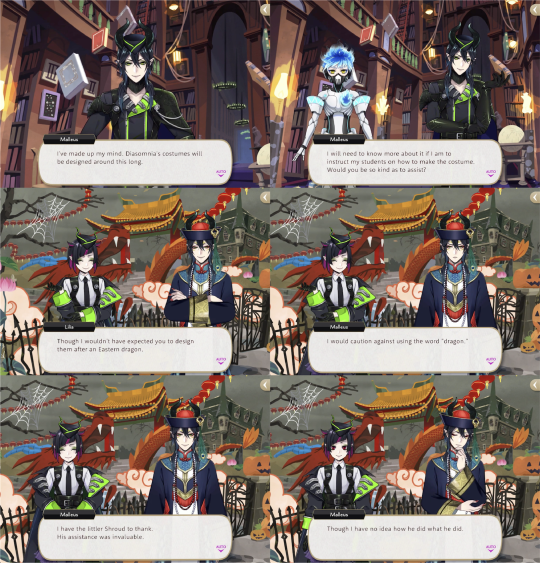
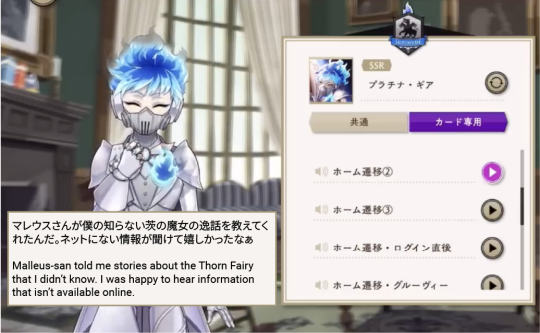
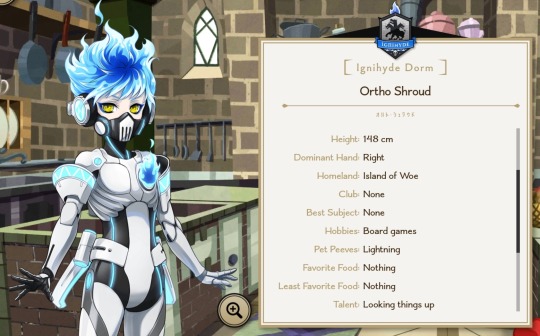
Ortho says that Malleus has told him stories about the Thorn Fairy that he didn’t know, and he is happy to have learned information that isn’t available online.
“Lightning” is what Ortho has listed as his most disliked thing on his profile, and it is briefly referenced in Wish Upon a Star. In Book 6, Ortho is taken out by Thunder spears.
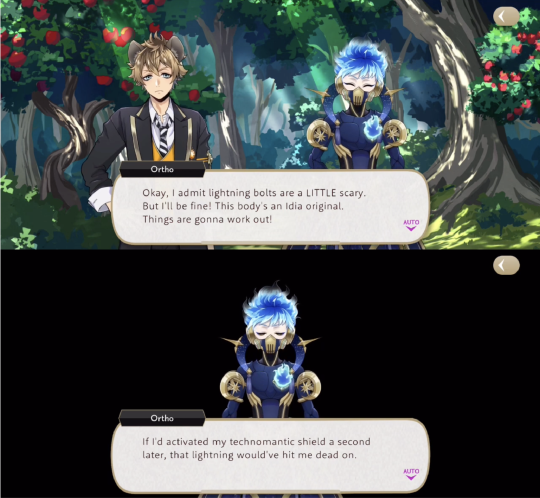
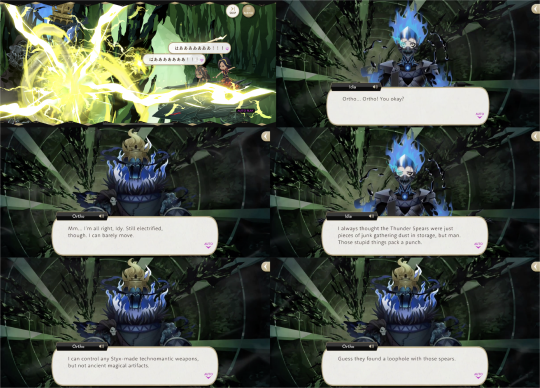
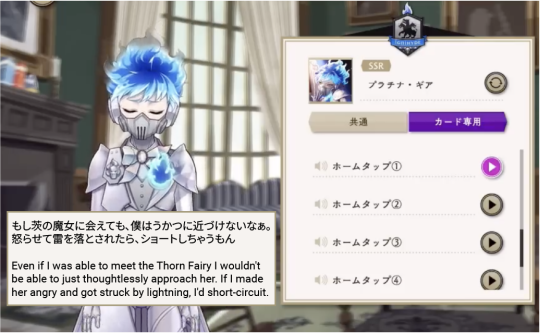
Ortho has a voice line about how he would have to be careful if he met the Thorn Fairy, as he would short circuit if she were to call down lightning out of anger.
Ortho says that he would choose Malleus to go with him to a deserted island out of all the school’s students, because he has heard that the weather on islands can be unpredictable but Malleus is powerful enough to be able to handle lightning strikes: “And I think if I asked nicely, he'd be willing to protect me from them.”
When they meet in Book 7, the over-blotted Malleus greets Ortho with a lightning strike.
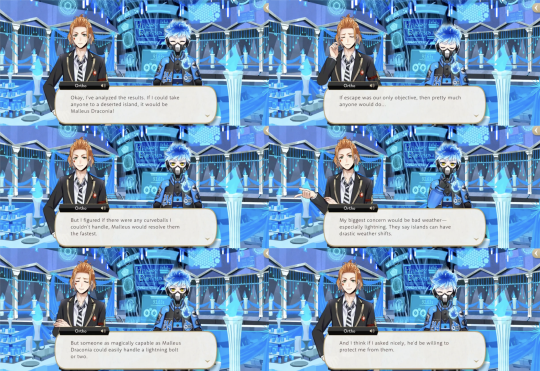

Ortho says that Malleus’ magic was able to easily pierce the anti-magic material that is his STYX-developed anti-magic armor plating.
Malleus’ spell takes Ortho’s technomantic cameras and circuits offline so that he cannot transfer in any other gear he has at the school.
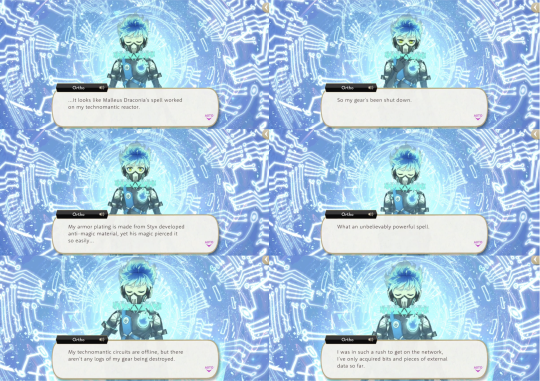
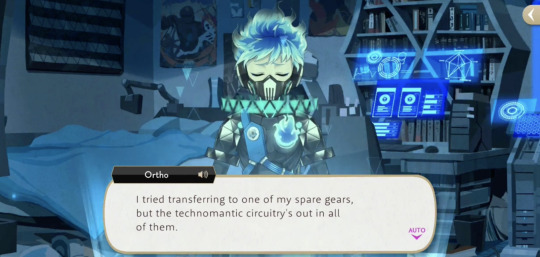
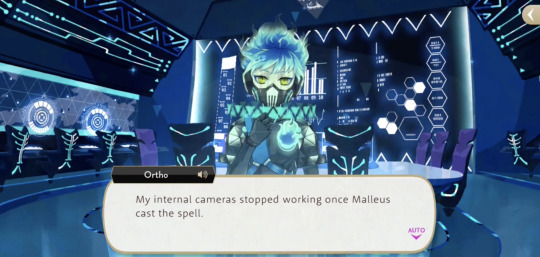
When they meet in Malleus’ domain Ortho mocks him with, “One of the top five mages in the world? Ancient magic and arcane realms? I'm not impressed,” which Malleus soon throws back at him, defeating Ortho in a battle and responding, “This is truly the apex of humanity's technological might? I'm not impressed.”
(The Chief Engineer takes issue with Malleus turning Ortho’s mockery back on humanity.)
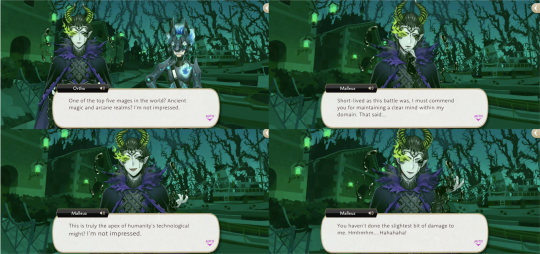
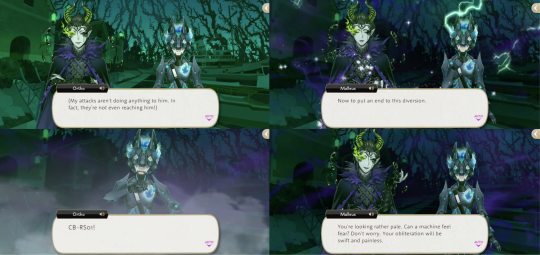
Malleus decides to obliterate Ortho, taking out one of Ortho’s Cerberus androids instead. Upon his second attempt Malleus’ attack misses and Ortho reflects, “It's almost like his CPU is overloaded and his processing power dropped…”
Malleus’ third attempt to kill Ortho takes out the second Cerberus android, instead.
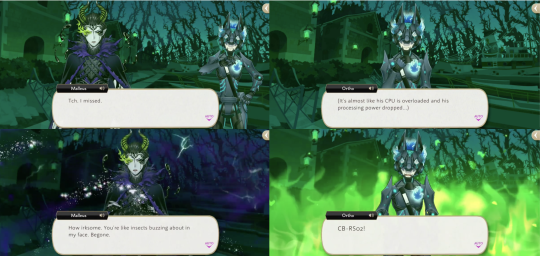
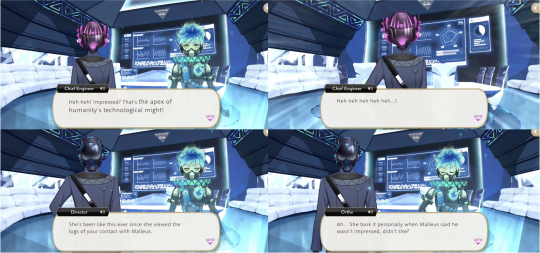
46 notes
·
View notes
Text
Ortho Updated Facts Part 7: Eating and Being Helpful
While Idia designs “oral supplement gear” for Ortho so that he is capable of eating with others, Ortho explains that he doesn’t get his energy through oral intake and doesn’t have any food preferences.
(It seems he is keeping data on the foods that others dislike, on the off-chance that such information may be useful one day.)



Instead of eating, Ortho will take photos of the food that others eat when they are around him.
He has an interesting voice line about how one of his android-dogs from Book 7 runs on electricity, “but for some reason it's also interested in baked treats...even though it can't actually eat them.”



Ortho seems to enjoy being helpful, offering his assistance to help in any way he can to any student, sometimes when his help is unwanted, such as when he offers to send a recording of Ace’s monologue during Phantom Bride to Epel, despite Ace’s disapproval.



After Silver injures himself during club activities Ortho offers his assistance, and at first Silver accepts.
Ortho creates a splint for Silver’s sprained ankle and Silver attempts to leave, but Ortho insists on doing “maintenance” on the rest of him.



Silver attempts to get away but Ortho strong-arms him into submission so that he can try out some of the functions that Idia has equipped him with that he has never activated before.


46 notes
·
View notes
Text
Ortho Updated Facts Part 3: Being a Student (pt3)
Another way Ortho is attempting to live as a normal student is by artificially limiting his own abilities:
In his birthday vignette Ortho explains that he can install data repositories to skip the necessity of modifying programs on his own through trial and error, but for learning animal linguistics he is actively choosing to learn through interactions with Lucius instead, which is much more time consuming.
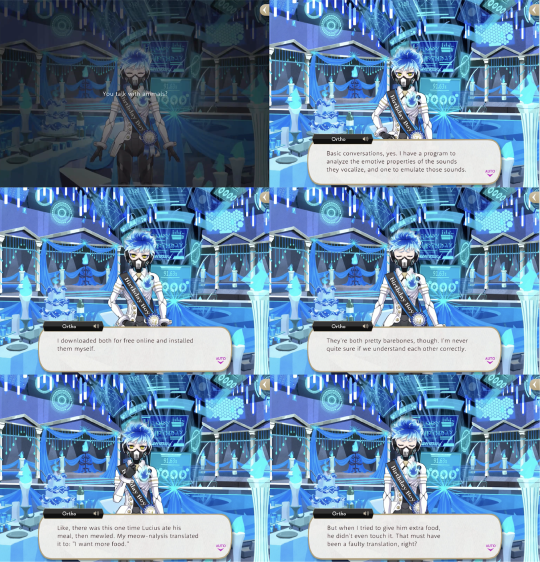
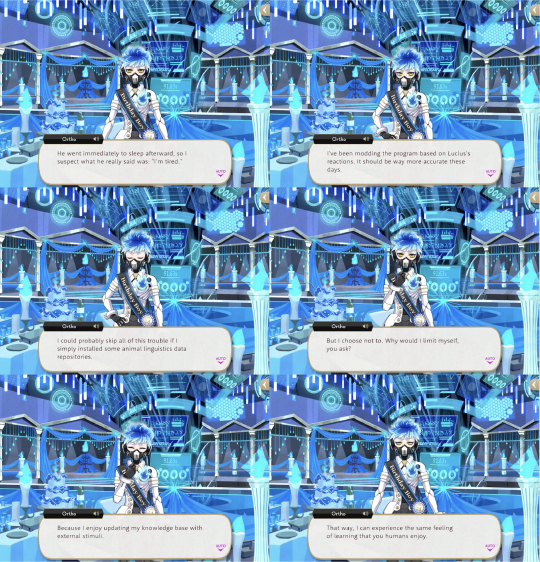
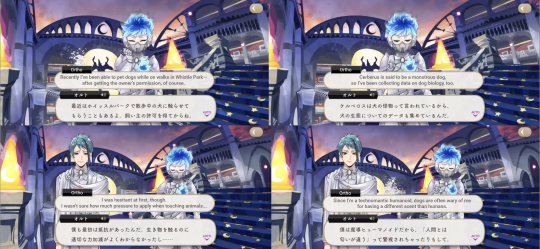
He explains that he is intentionally limiting himself, “because I enjoy updating my knowledge base with external stimuli. That way, I can experience the same feeling of learning that you humans enjoy.”
He brings this up again in another birthday vignette, saying that he has been collecting data on dog biology because of his interest in Cerberus.

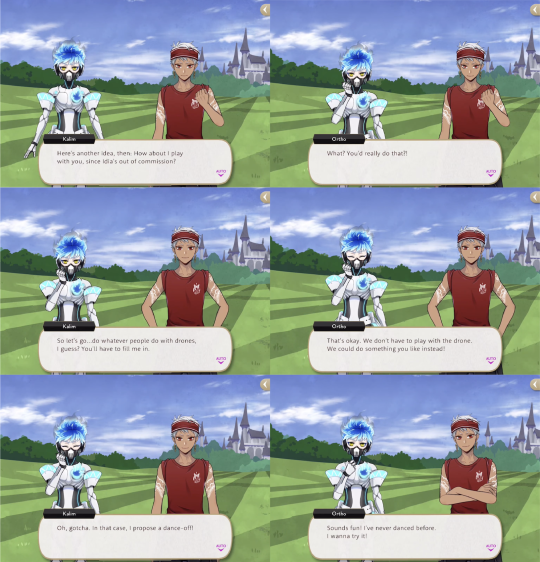

He says that he would get permission to pet dogs in Whistle Park but at first he did not know how much pressure to apply while petting them, and they we wary of him for smelling different than humans. Eventually he began communicating with them to build trust, learning through trial and error rather than a pre-installed translation app. He says that his translation accuracy has greatly improved, and there are dogs who now recognize and approach him on their own.
This comes up again in a vignette with Kalim where Ortho volunteers to download information on a variety of dance moves so that they can dance together, but Kalim tells him “it kinda defeats the purpose if you’re perfect right out of the gate…slowly getting better through practice is part of the fun!”
Ortho says that “it seems…inefficient.”


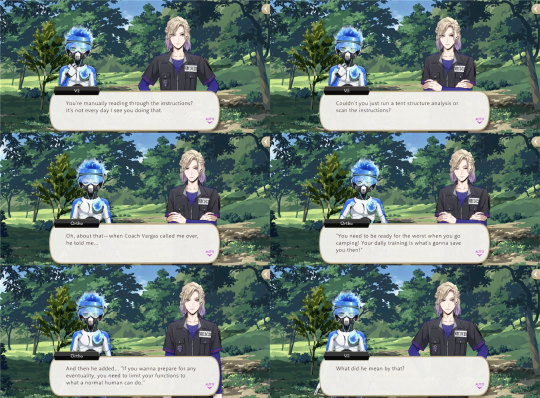
We see Riddle offer to teach Ortho how to ballroom dance during Spectral Soiree, where he again meets up with Kalim.
Ortho is told by Vargas to limit his own functions “to what a normal human can do” for Vargas Camp 2, and Ortho concedes, saying, “There are situations where my capabilities would mean nothing in the face of Mother Nature. My equipment could also break down. So it would be beneficial to proactively train under a simulated worst-case scenario.” Ortho also says it is more fun to limit himself, as it feels like real camping.
Ortho also removes “a lot of components” from his usual school uniform gear was crafting his rabbit gear because he “wanted to get into the spirit of things with everyone.”


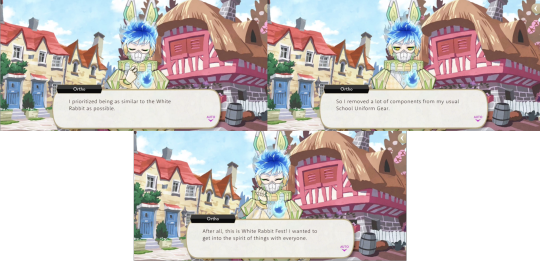
49 notes
·
View notes